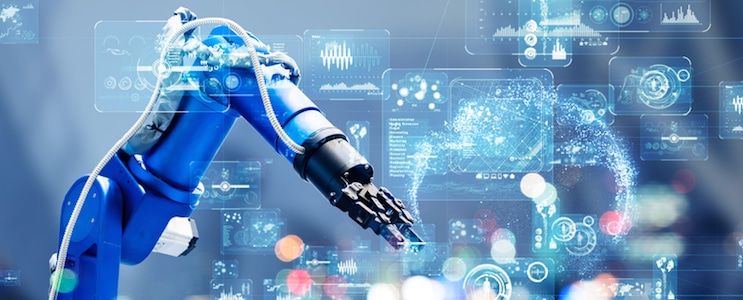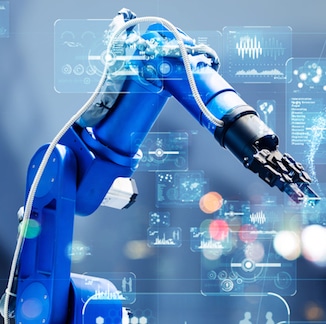
With the introduction of the concept of Industry 4.0, the evolution of manufacturing to cyber-physical systems, manufacturing has become focused on the idea of “Digital Transformation”. Depending on the industry, Digital Transformation has come to mean anything from automating classic business processes using traditional enterprise software, like ERP systems, to fundamentally changing the business model such as shifting from manufacturing capital goods to selling outcomes as a service. In all these cases the focus has been on using digital technology to automate business processes to reduce labor, material, or energy usage, improve efficiency, reduce downtime, improve quality, or some combination of these goals.
Also, in almost all these cases the emphasis has been on technology’s ability to automate processes. So much so that the field of robotic process automation (RPA) has become the latest technology buzzword.
At iBase-t, we believe that 2020 is forcing manufacturers to rethink Digital Transformation. Between COVID-19, the very visible impact of climate change, and the global geopolitical environment, just automating business processes will not deliver the benefits many companies seek from their Digital Transformation initiatives.
In 2021 Automation Needs to Be Smarter
Automation isn’t a new concept. Manufacturers have been automating for decades. The term RPA derives from the idea of industrial robots ultimately replacing assembly workers (and even their supervisors) with IT “robots.” Past manufacturing automation and the current “office automation” models have generally followed a “rules-based” approach. Automation has been hardcoded to follow mathematical models or logical sequences that allow for consistent repetitive behavior. Today’s RPA tools talk about automating repetitive tasks by using digital techniques to learn repetitive patterns. The emphasis has been on doing things in a standardized and repeatable way.
If 2020 has taught manufacturers anything, it is that long term assumptions can be invalidated overnight. Facilities suddenly needed to be reconfigured to provide social distancing – a term none of us likely used in a sentence six months ago. Similarly, supply chains have been completely broken due to pandemic hot spots or extreme weather events, power has become unreliable due to natural disasters forcing outages, and global trade deals have been overturned in weeks based on political moves by governments.
Modern automation strategies must get better, starting with flexibility and agility. Automation can no longer be about taking repetitive tasks away from humans.
Read more about this concept here, The Future of Automation, Part I: How AI will Impact Automation.
Automation strategies now need to help deal with the unexpected and singular challenges of business. This requires shifting the focus from doing to understanding. From a technology perspective, it means building systems that support the identification of problems and optimizing processes, in real-time, to adapt and adjust to new opportunities.
This will require solutions that collect, validate, and process both structured and unstructured data across the value chain. Artificial intelligence (AI) based techniques will need to operate at the edge, in the Cloud, and in a cooperative fashion together to solve complex business problems that may never have been seen previously.
Think Big, Act Small
Achieving this vision requires companies to think bigger about their entire value chain – including each of its dependencies. At the same time, now is the time to think smaller into the use of microservices as a technology architecture that is immensely scalable and highly flexible. When it comes to putting the right building blocks in place to enable Digital Transformation in 2021 and beyond, manufacturers need to make sure they can evolve quickly.
This shift may entail moving from large monolithic applications to a business model-based approach. At iBase-t, we are committed to the shop floor and the MRO value chain. Our focus is on providing our end-user partners with an intelligent platform that helps them rapidly adapt to whatever the future throws at them. Our technology investments in Cloud, microservices, and AI and machine learning capabilities provide clients a highly scalable solution that can be deployed in small but ongoing steps to allow them to truly digitally transform their operations.


